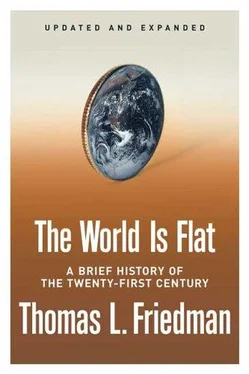But when a company is the pioneer, the vanguard, the top dog, the crown jewel, it is hard to look in the mirror and tell itself it is in a not-so-quiet crisis and better start to make a new history or become history. Gerstner decided that he would be that mirror. He told IBM it was ugly and that a strategy built largely around designing and selling computers-rather than the services and strategies to get the most out of those computers for each customer-didn't make sense. Needless to say, this was a shock for IBMers.
“Transformation of an enterprise begins with a sense of crisis or urgency,” Gerstner told students at Harvard Business School, in a December 9, 2002, talk. “No institution will go through fundamental change unless it believes it is in deep trouble and needs to do something different to survive.” It is impossible to ignore the parallel with America as a whole in the early twenty-first century.
When Lou Gerstner came in, one of the first things he did was replace the notion of lifetime employment with the notion of lifetime em-ployability. A friend of mine, Alex Attal, a French-born software engineer who was working for IBM at the time, described the shift this way: “Instead of IBM giving you a guarantee that you will be employed, you had to guarantee that you could stay employable. The company would give you the framework, but you had to build it yourself. It's all about adapting. I was head of sales for IBM France at the time. It was the mid-nineties. I told my people that in the old days [the concept of] lifetime employment was only a company's responsibility, not a personal responsibility. But once we move to a model of employability, that becomes a shared responsibility. The company will give you access to knowledge, but you have to take advantage of it... You have to build the skills because it will be you against a lot of other people.”
When Gerstner started to change the paradigm at IBM, he kept stressing the issue of individual empowerment. Said Attal, “He understood that an extraordinary company could only be built on a critical mass of extraordinary people.”
As at IBM, so in America. Average Joe has to become special, specialized, or adaptable Joe. The job of government and business is not to guarantee anyone a lifetime job-those days are over. That social contract has been ripped up with the flattening of the world. What government can and must guarantee people is the chance to make themselves more employable. We don't want America to be to the world what IBM was becoming to the computer industry in the 1980s: the people who opened the field and then became too timid, arrogant, and ordinary to play on it. We want America to be the born-again IBM.
Politicians not only need to explain to people the flat world, they need to inspire them to rise to the challenge of it. There is more to political leadership than a competition for who can offer the most lavish safety nets. Yes, we must address people's fears, but we must also nurse their imaginations. Politicians can make us more fearful and thereby be disablers, or they can inspire us and thereby be enablers.
To be sure, it is not easy to get people passionate about the flat world. It takes some imagination. President Kennedy understood that the competition with the Soviet Union was not a space race but a science race, which was really an education race. Yet the way he chose to get Americans excited about sacrificing and buckling down to do what it took to win the Cold War-which required a large-scale push in science and engineering-was by laying out the vision of putting a man on the moon, not a missile into Moscow. If President Bush is looking for a similar legacy project, there is one just crying out-a national science initiative that would be our generation's moon shot: a crash program for alternative energy and conservation to make America energy-independent in ten years. If President Bush made energy independence his moon shot, in one fell swoop he would dry up revenue for terrorism, force Iran, Russia, Venezuela, and Saudi Arabia onto the path of reform-which they will never do with $50-a-barrel oil-strengthen the dollar, and improve his own standing in Europe by doing something huge to reduce global warming. He would also create a real magnet to inspire young people to contribute to both the war on terrorism and America's future by again becoming scientists, engineers, and mathematicians. “This is not just a win-win,” said Michael Mandelbaum. “This is a win-win-win-win-win.” I have consistently been struck that my newspaper columns that have gotten far and away the most positive feedback over the years, especially from young people, have been those that urged the president to call the nation to this task. Summoning all our energies and skills to produce a twenty-first-century fuel is George W. Bush's opportunity to be both Nixon to China and JFK to the moon in one move. Unfortunately for America, it appears as though I will go to the moon before President Bush will go down this road.
Muscles
Since lifetime employment is a form of fat that a flat world simply cannot sustain any longer, compassionate flatism seeks to focus its energy on how government and business can enhance every worker's lifetime employability. Lifetime employment depends on preserving a lot of fat. Lifetime employability requires replacing that fat with muscle. The social contract that progressives should try to enforce between government and workers, and companies and workers, is one in which government and companies say, “We cannot guarantee you any lifetime employment. But we can guarantee you that government and companies will focus on giving you the tools to make you more lifetime employable.” The whole mind-set of a flat world is one in which the individual worker is going to become more and more responsible for managing his or her own career, risks, and economic security, and the job of government and business is to help workers build the necessary muscles to do that.
The “muscles” workers need most are portable benefits and opportunities for lifelong learning. Why those two? Because they are the most important assets in making a worker mobile and adaptable. As Harvard University economist Robert Lawrence notes, the greatest single asset that the American economy has always had is the flexibility and mobility of its labor force and labor laws. That asset will become even more of an advantage in the flat world, as job creation and destruction both get speeded up.
Given that reality, argues Lawrence, it becomes increasingly important for society, to the extent possible, to make benefits and education— the two key ingredients of employability-as flexible as possible. You don't want people to feel that they have to stay with a company forever simply to keep their pension and health benefits. The more the workforce feels mobile -in terms of health care, pension benefits, and lifelong learning possibilities-the more it will be willing and able to jump into the new industries and new job niches spawned by the flat world and to move from dying companies to thriving companies.
Creating legal and institutional frameworks for universal portability of pensions and health care -in addition to Social Security, Medicare, and Medicaid-will help people build up such muscles. Today roughly 50 percent of Americans don't have a job-based pension plan, other than Social Security. Those who are fortunate enough to have one cannot easily take it with them from job to job. What is needed is one simple universal portable pension scheme, along the lines proposed by the Progressive Policy Institute, that would get rid of the confusing welter of sixteen different tax-deferred options now offered by the government and consolidate them all into a single vehicle. This universal plan, which you would open with your first job, would encourage workers to establish 401 (k) tax-deferred savings programs. Each worker and his or her employer could make contributions of cash, bonuses, profit sharing, or stock, depending on what sorts of benefits the specific employer offered. These assets would be allowed to build up tax-free in whatever savings or investment portfolio options the worker chose. But if and when it came time to change jobs, the worker could take the whole portfolio with him or her and not have to either cash it out or leave it under the umbrella of the previous employer. Rollover provisions do exist today, but they are complicated and many workers don't take advantage of them because of that.
Читать дальше












